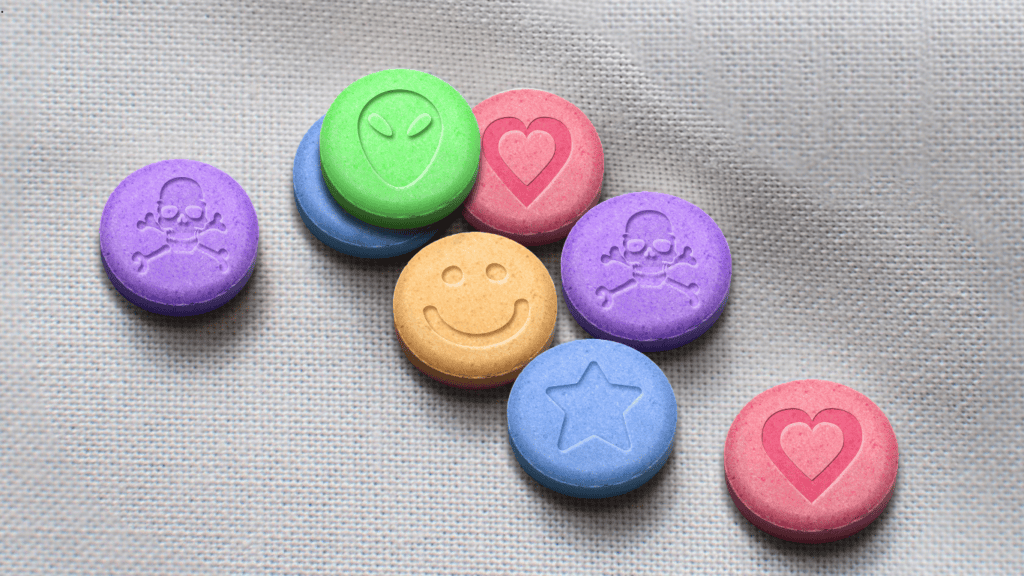At Right Path Rehab, we understand how difficult it can be to face the reality of ecstasy addiction, whether you or someone you love is struggling. MDMA—commonly known as ecstasy or molly—is a synthetic drug that produces intense feelings of euphoria, heightened sensory perception, and emotional connectivity. While often glamorized in party scenes, abusing ecstasy can lead to severe mental, emotional, and physical health consequences.
Many young adults use ecstasy pills recreationally, often unaware of the risks associated with long-term drug abuse. MDMA affects the brain’s neurotransmitters, flooding the system with serotonin, dopamine, and norepinephrine. Over time, this can lead to substance use disorder, leaving individuals dependent on the drug to experience happiness or emotional stability. Combining ecstasy abuse with other drugs, such as alcohol or stimulants, further increases the risk of dangerous side effects, including dehydration, hyperthermia, and heart complications.
If you or a loved one is struggling with the effects of ecstasy substance abuse, recognizing the warning signs early is crucial. Abusing ecstasy can have devastating effects, but recovery is possible with the right support. At Right Path Rehab, we provide evidence-based treatment to help individuals break free from addiction and regain control of their lives. With compassionate care and a structured approach, we guide you toward a healthier, more fulfilling future.
Understanding Ecstasy Abuse: How MDMA Drug Abuse Affects the Brain and Body
While it’s often used recreationally at parties and music festivals, ecstasy abuse can have serious negative consequences on both mental and physical health. What may start as occasional ecstasy use can quickly turn into ecstasy addiction, leading to long-term changes in brain chemistry and overall well-being.
How Ecstasy and Other Drugs Affect the Brain
MDMA impacts the brain by flooding it with neurotransmitters like serotonin, dopamine, and norepinephrine. These chemicals regulate mood, pleasure, and energy levels, creating the euphoric sensations people seek when abusing ecstasy. However, this artificial surge comes at a cost.
- Serotonin depletion: After the effects wear off, users often experience ecstasy withdrawal, including extreme fatigue, irritability, and depression due to depleted serotonin levels.
- Cognitive disruption: Long-term ecstasy use can impair memory, focus, and emotional regulation.
- Increased dependency: As the brain adjusts to repeated MDMA exposure, individuals may struggle to feel happiness or emotional stability without the drug, increasing the risk of substance use disorder.
Common Effects of Ecstasy Use
While the short-term effects of MDMA may seem pleasurable, continued drug abuse can cause serious negative consequences, including:
- Increased sensory perception and emotional connectivity
- Elevated energy levels followed by severe exhaustion
- Suppressed appetite, leading to weight loss and malnutrition
- Heightened confidence and lowered inhibitions, increasing risky behaviors such as unsafe sex or combining MDMA with other drugs
Physical Dangers of Ecstasy Addiction
Beyond its effects on mental health, ecstasy addiction takes a toll on the body. The physical symptoms of abusing ecstasy include:
- Severe dehydration and hyperthermia: MDMA raises body temperature, leading to excessive sweating and heatstroke, which can be fatal in extreme cases.
- Heart strain and high blood pressure: The stimulant properties of MDMA increase heart rate, putting users at risk for cardiovascular complications.
- Teeth grinding and jaw clenching: Common among users, this can cause long-term dental damage.
The cycle of substance abuse can be hard to break, but early intervention is key. Recognizing the common signs of ecstasy addiction can help individuals take the first step toward recovery. If you or a loved one are struggling with MDMA dependency, seeking professional help can provide the guidance needed to heal.
How Ecstasy Addiction Develops
Repeated ecstasy use floods the brain with serotonin and dopamine, creating intense euphoria, emotional warmth, and a sense of deep connection with others. Over time, however, the brain becomes reliant on the drug to feel pleasure, leading to severe brain damage in neurotransmitter pathways. This condition, known as anhedonia, makes it difficult for users to experience joy without MDMA, fueling the cycle of addiction.
One of the key psychological symptoms of MDMA abuse is emotional instability. Many individuals turn to the drug as a way to escape feelings of loneliness, depression, or trauma. The more frequently a person begins using ecstasy, the harder it becomes to function without it, increasing the risk of addiction.
Common Signs of Ecstasy Addiction
Recognizing the common signs of ecstasy abuse is crucial for early intervention. Warning signs include:
- Dilated pupils and excessive sweating
- Emotional highs and severe crashes: Mood swings, depression, and anxiety between uses
- Compulsive drug-seeking behavior: Prioritizing MDMA over personal and professional responsibilities
- Neglecting hygiene, sleep, and nutrition: Loss of appetite and weight loss due to pill form MDMA consumption
- Withdrawal symptoms such as fatigue, paranoia, and difficulty concentrating
- Increased use of other substances: Many users combine MDMA with alcohol or other drugs, increasing health risks

Recognizing MDMA Addiction Symptoms
Ecstasy abuse can often go unnoticed, especially when it begins as occasional recreational use. However, as the drug’s effects become more intense and reliance increases, noticeable withdrawal symptoms and behavioral changes start to emerge. Recognizing the effects of ecstasy abuse early can help prevent long-term damage and lead to timely treatment options.
Physical Symptoms of Ecstasy Abuse
MDMA, commonly referred to as a club drug, overstimulates the body’s central nervous system, causing various physical symptoms that can become increasingly severe with frequent use. Signs of ecstasy abuse include:
- Persistent fatigue or insomnia: Disruptions in sleep patterns, leading to exhaustion
- Teeth grinding or jaw clenching: A common side effect due to increased muscle tension
- Loss of appetite and significant weight loss: MDMA suppresses hunger, leading to malnutrition over time
- Sweating, dehydration, or frequent overheating: A result of prolonged activity combined with the drug’s stimulant effects
MDMA use can also lead to dangerous overheating, which, in extreme cases, requires immediate medical attention. According to the National Institute on Drug Abuse, extreme body temperature caused by MDMA can lead to organ failure, coma, or even death if left untreated.
Emotional Symptoms of Ecstasy Abuse
Beyond its physical effects, MDMA substance abuse significantly impacts emotional and mental well-being. Individuals experiencing co-occurring disorders such as depression and anxiety may turn to pure MDMA as a way to self-medicate, only to find that it worsens their condition over time. Common emotional symptoms include:
- Intense mood swings: Rapid emotional highs followed by deep crashes
- Anxiety, paranoia, or panic attacks: Increased stress and irrational fears
- Depression, particularly after the effects of the drug wear off: A result of serotonin depletion in the brain
- Feelings of emotional numbness or detachment: Reduced ability to feel pleasure or connection with others
MDMA’s impact on sexual arousal can also be concerning. While some users report heightened sensations, prolonged use can lead to sexual dysfunction, emotional detachment, and difficulty forming meaningful relationships.
Behavioral Symptoms of MDMA Addiction
Changes in behavior are often the most apparent signs of an ecstasy addiction, especially when an individual starts neglecting important responsibilities in favor of drug use. Key behavioral symptoms include:
- Preoccupation with obtaining or using MDMA – Obsessively planning when and how to take the drug
- Neglecting responsibilities at work, school, or home – Declining performance and loss of motivation
- Isolating from friends or family members – Withdrawing from loved ones to avoid confrontation
- Engaging in risky behaviors – Unsafe sexual practices, driving under the influence, or mixing MDMA with other drugs like bath salts or stimulants, increasing the risk of overdose
The Long-Term Consequences of MDMA Addiction
Chronic MDMA use can lead to severe and lasting damage to both the brain and body. Many users report experiencing long-term cognitive issues, emotional instability, and physical health problems even after they stop using the drug. Recognizing these potential consequences can serve as a wake-up call to seek help.

How Right Path Rehab Can Help
At Right Path Rehab, we take a personalized and holistic approach to treating MDMA addiction. Recovery isn’t a one-size-fits-all process, and our team is dedicated to addressing the unique needs of each individual who walks through our doors. From the initial detox process to ongoing therapy and aftercare, we are with you every step of the way to ensure lasting recovery.
If you or a loved one are struggling with MDMA addiction, know that help is available. At Right Path Rehab, we believe in the power of recovery and the resilience of the human spirit. Our compassionate team is here to provide the care and support you need to break free from the cycle of addiction and reclaim your life.
Don’t wait to get the help you need. Contact us today to learn more about our MDMA addiction treatment programs and take the first step toward healing. Your brighter, healthier future starts now.

